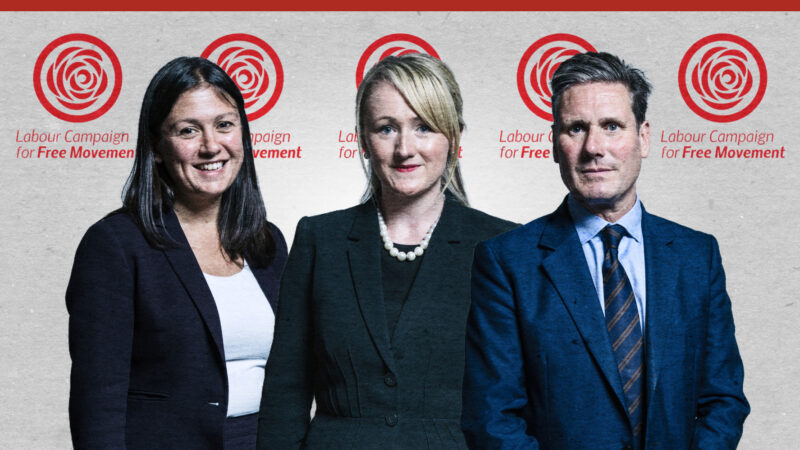
It is just over two months since the election, but we already know it will be a tough five years for migrants. The Tories have voted against protecting child refugees, resumed deportation charter flights and announced new immigration plans that reduce human beings to economic units.
In the face of these attacks, Labour needs to stand firmly with migrants. There seems to be a consensus within the party that we should not return to overt pandering to anti-migrant sentiment. There is no appetite for bringing back “controls on immigration” mugs or New Labour-style scapegoating of asylum seekers.
However, Jeremy Corbyn’s Labour doesn’t have a flawless record on immigration either: the end of free movement, which constitutes the biggest expansion of border controls in decades, was accepted without a fight, and when the topic of immigration came up, frontbenchers often preferred changing the topic to confronting myths and prejudice head-on. Last year, Labour’s decision to abstain on the second reading of the Immigration Bill caused a stir among members which forced a last-minute U-turn.
In this year’s leadership election, all candidates have repeatedly made positive comments about immigration, which is welcome and highlights how the narrative has shifted over the past five years. However, it is easier to say kind words about migrants to a membership that wants to hear them; harder to commit to policies one can be held to account on once the contest is over, and the Tories and the media continue spouting their usual attack lines. That’s why the Labour Campaign for Free Movement decided to ask all contenders for leader and deputy leader a set of policy questions, largely based on the immigration motion that near-unanimously passed at the 2019 Labour conference.
In the past, all three leadership hopefuls wavered on freedom of movement: Keir Starmer called for the rules to be changed already in early 2017, when the leadership was still defending it. Less than a year later on BBC Question Time, Rebecca Long-Bailey described ending free movement as an “opportunity to end the undercutting of pay by people that have been shipped in from Europe”. Meanwhile, Lisa Nandy was claiming that free movement has allowed politicians to ignore the skills and aspirations of British citizens.
This rhetoric has been absent from the contest. In his response to our questions, Starmer stated that free movement with Europe has been mutually beneficial and needs protecting after Brexit. Nandy says that Labour “should have been bold enough” to defend it. Only Long-Bailey doesn’t touch on the issue of EU free movement but does call out the government for treating European migrants as “bargaining chips”. Starmer and Nandy agree, with the latter calling for a review of the settled status scheme to ensure that all EU nationals already here can remain in the UK. All candidates agree on extending voting rights to all long-term residents, regardless of nationality.
On detention centres, Nandy is clear: “Of course they should be closed.” Long-Bailey also commits to opposing “the cruelty of detention centres, closing them and looking at alternatives”, whereas Starmer stops at reaffirming Labour’s manifesto commitments to shutting down Yarl’s Wood and Brook House, ending indefinite detention, and promising to end the role of the private sector in running centres.
Long-Bailey is the only candidate for leader pledging to scrap “no recourse to public funds” – a policy that denies migrants access to the social safety net, including benefits, housing and free school meals. Starmer is the only one to include as part of his answer giving asylum seekers the right to work – currently, many are forced to live on government support of just £5.39 per day. Nandy puts forward a plan for fighting hate crime: through committing police resources, giving places of worship funding to defend themselves, and holding the media accountable.
It is unfortunate that none of the leadership candidates have committed to honouring our conference policy in full. Dawn Butler is the only respondent to mention and explicitly endorse it. Out of the candidates for deputy leader, Rosena Allin-Khan deserves credit for not only answering every question one-by-one, in most cases with an unequivocal yes, but also uploading the reply on her website and proudly sharing on social media.
Richard Burgon wants to see a “managed closure” of detention centres, an end to the hostile environment and “no recourse to public funds,” full voting rights for all residents and the right to work for asylum seekers. Ian Murray also provided a comprehensive response, although some of his pledges are more careful: a “review” of the detention system, extending the franchise to be “considered” as part of a new constitutional settlement. Angela Rayner’s reply was the most disappointing one, praising the values of “internationalism, solidarity and cooperation” but offering few policy commitments.
The LCFM will not be making an endorsement in this election. However, we encourage our supporters to read all responses here and take them into consideration when voting – and join us campaigning for migrants’ rights regardless of who wins.




More from LabourList
Josh Simons resigns as Cabinet Office minister amid investigation
‘After years of cuts, Labour’s local government settlement begins to put things right’
‘The Sherriff of Wild Westminster: what must change in elections bill’